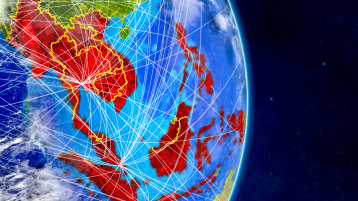Successful Asian Summer School Initiatives from the Schmalenbach Institute of Business and Economics

The Schmalenbach Institute of Business and Economics advances internationalization through two immersive application-oriented summer school initiatives in Asia, successfully bringing together students and international partners from industry and academia.
GlobalMBA 2024-2025 Cohort’s Jakarta-Trip Successfully Connects Students with CEOs and Business Leaders from four Asian Countries
The GlobalMBA 2024-2025 Cohort recently concluded its dynamic two-week program in Jakarta, Indonesia, held from July 7th to 18th. Organized and conducted by Prof. Dr. Ridwan D. Rusli and Dr. Steffen Wolfer from TH Köln’s Faculty of Business, Economics and Law as part of Prof. Rusli’s course “Business Environment Asia”, the immersive event brought together 19 GlobalMBA students and business leaders in the heart of one of Southeast Asia’s fastest growing economies. Jakarta offered the perfect backdrop for bridging global business education and regional economic insights from Asia, facilitated through a blend of on-site meetings and virtual discussions.
During the first week, students were hosted by the Economic Research Institute for ASEAN and East Asia (ERIA), where they engaged with experts on issues of regional integration, development, and sustainability. On-site visits to major companies such as the Ciputra Group and PwC Jakarta gave students first-hand insights into property development, finance, infrastructure, and energy transition strategies and politics. At Permata Bank, one of the largest commercial banks in the country, students delved into innovations in banking, risk management, and corporate social responsibility alongside the bank’s key executive team.
The second week continued with valuable on-site exposure to Indonesia’s vital resources and digital sectors. The visit agenda featured insights into sustainable mining with Vale Indonesia, the digital economy with Gojek-GoTo executives, corporate social responsibility at Astra-Honda Motor, and data infrastructure with the leadership team from Data Center Indonesia (DCI).
Over the two weeks, students also had the opportunity to take part in virtual meetings with major institutions across Asia, including the Singaporean-German Chamber of Industry and Commerce and PwC Singapore, Siam Commercial Bank from Thailand as well as Longi Solar from China and an ex-Degussa, Bayer and Covestro China executive.
Bringing together all these exceptional experiences, the GlobalMBA Summer School 2025 in Jakarta proved to be a unique platform for cross-cultural knowledge exchange, networking, and applied learning. By connecting students with CEOs, senior executives and leading industry experts, and exposing them to real-world business challenges, the program empowered participants to broaden their perspectives and enhance their skills for future success in the international business arena.
Copyright: Permata Bank
4-Country 4-University Circular Economy Summer School 2025 with TH Köln Students
TH Köln successfully completed the 2025 Circular Economy Summer School, held from 8–11 September at the Südstadt and Deutz campuses and online. The program brought together ten students from TH Köln’s International Business BSc and MA, and Renewable Energy-, Water- and Natural Resource Management MSc programs, working alongside more than forty chemical- and environmental engineering and applied sciences students and eight lecturers from three partner universities, whom TH Köln collaborated with since 2024: Chiang Mai University (Thailand), Hanoi University of Science and Technology (Vietnam), and the University of Applied Sciences and Arts Northwestern Switzerland (FHNW, Muttenz).
Over four intensive days, participants engaged in lectures, cross-country teamwork, and applied case studies addressing pressing global challenges in plastic, electronic and food waste. The program combined theoretical perspectives on circular economy business models with hands-on exercises. First, in a Tear-down Lab student teams analyzed products comprising metals, electronics and plastics materials such as water boilers, rice cookers, smart power meters with regard to their carbon emissions and linear supply chains, production and business models. Second, case studies on food waste were undertaken, whereby the collection and reprocessing of used cooking oil into bioplastics and biodiesel were examined. Guided by intercultural collaboration, the cross-country interdisciplinary student teams developed process flowcharts, business canvases and innovative solutions to “bring their object into circularity,” which they presented at the closing sessions.
“The Summer School demonstrates the power of intercultural and interdisciplinary collaboration in shaping sustainable futures, and we are grateful to our three partner universities, coordinated by the University of Applied Sciences and Arts Northwestern Switzerland, for having invited us to participate and help shape this unique program” said Prof. Dr. Ridwan D. Rusli, Faculty of Business, Economics and Law, who coordinated the program at TH Köln, in collaboration with Mr. Francisco A. Carrasco, MSc, PhD candidate in the Institute of Electrical Power Engineering (Institut für Elektrische Energietechnik) of Prof. Dr. Johanna May. “Our ten students not only learned the tools and methods of circular economy but also worked side by side with peers from Asia and Switzerland to apply them in concrete cases. This exchange equips them to contribute meaningful innovations to future global sustainability transitions.”
October 2025
